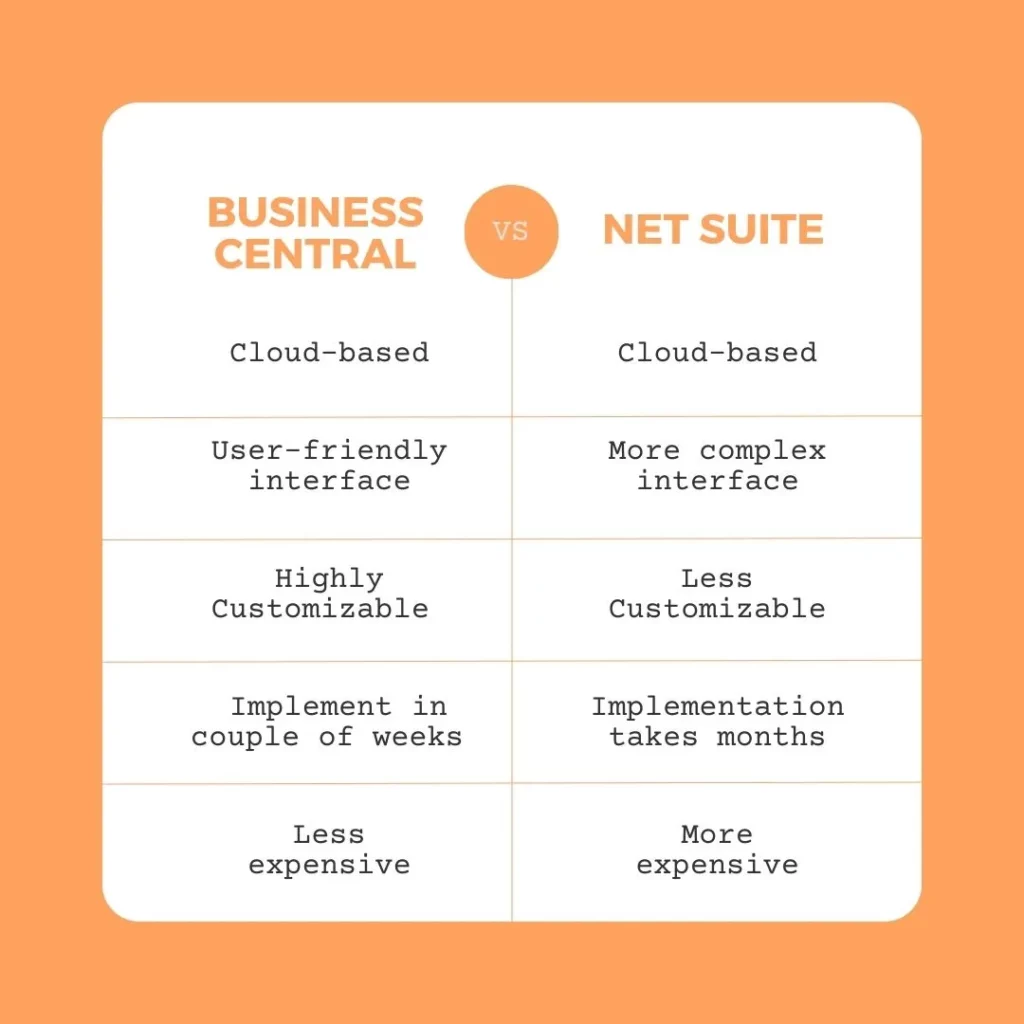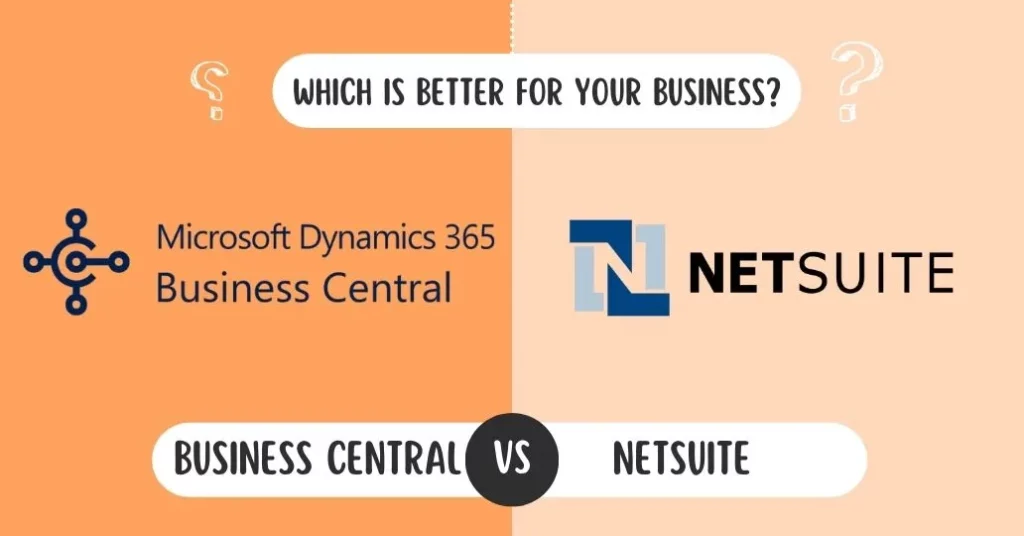In the ever-evolving landscape of business management software, two giants stand tall: Dynamics 365 Business Central and NetSuite. But, which one is the best fit for your needs? We’re here to break it down for you in plain English, without the jargon. This article is about Dynamics 365 Business Central vs NetSuite and will help you understand the key differences and similarities between Business Central and NetSuite, ultimately guiding you to the best choice for your business.
Let’s Compare: Dynamics 365 Business Central vs NetSuite
1. The Basics
Before we dive into the specifics, let’s get a grip on the basics. Dynamics 365 Business Central, often dubbed ‘D365,’ is a Microsoft product. On the other hand, NetSuite is owned by Oracle. Both aim to streamline your business processes, but they take different routes to get there.
2. Pricing:
The age-old question in software: How much does it cost? Dynamics 365 Business Central often appears more budget-friendly upfront, with a subscription model. NetSuite, on the other hand, can be costlier, but it bundles many features. It’s like choosing between à la carte and a buffet. It depends on your appetite and budget.
3. Ease of Use:
You don’t want your employees scratching their heads trying to figure out the software. D365 is known for its user-friendliness, with an interface that’s easy to navigate. NetSuite, while robust, might take a bit more time to master. Think of it as choosing between a smartphone with a single button or one with many features but a learning curve.
4. Customization:
Your business isn’t like any other, so your software should adapt. D365 offers decent customization options, but NetSuite takes the customization cake with its comprehensive suite of tools. It’s like buying a suit off the rack versus having one tailor-made.
5. Scalability:
As your business grows, so should your software. Both D365 and NetSuite are scalable, but D365 might require some additional integrations to keep up. It’s like choosing between a house you can expand or one that comes with a garden already.
6. Integration Capabilities
Do you want your software to play nice with others? D365 seamlessly integrates with other Microsoft tools. NetSuite, however, has an extensive library of integrations. It’s like deciding between a puzzle piece that fits perfectly or one you need to reshape.
7. Support and Community
When things go awry, you need help. Microsoft has a vast user base, meaning plenty of forums and communities to find support for D365. NetSuite offers robust support, but its user base is smaller. Think of it as living in a bustling city or a cozy town—both have their perks.
8. Data Security
Your data is your treasure. D365 ensures data security with Microsoft’s robust measures. NetSuite, too, is committed to keeping your data safe. It’s like comparing two banks; one is backed by a big corporation, the other by an equally reputable entity.
9. Reporting and Analytics
To make informed decisions, you need data. D365’s reporting is impressive, but NetSuite’s analytics are more advanced, offering a deeper dive into your business’s health. It’s akin to choosing between a basic weather forecast and a meteorological radar.
10. The Mobile Experience
In our mobile world, being tied to a desk is a no-no. Both D365 and NetSuite offer mobile apps, but NetSuite’s app comes with a broader range of features. It’s like choosing between a flip phone and a sleek smartphone with all the apps you need.
Add-Ons and Extra App
Both Microsoft Dynamics 365 Business Central and NetSuite offer a diverse range of additional functionalities that can be seamlessly integrated into their core systems, tailoring the software to meet your specific business requirements.
Consult Your Partner:
It’s crucial to engage in a discussion with your software partner to identify which additional functionalities are essential for your business’s success. A partner with expertise can help you make an informed decision based on your unique needs.
Real-World Example:
Consider a recent case where a customer had to choose between NetSuite and Business Central. The customer opted for NetSuite due to a specific app integration that significantly enhanced their business’s performance. NetSuite was the perfect fit for their specific needs. It’s important to note that, as a Microsoft Dynamics Partner, our primary goal is to see your business thrive with the right solution, even if it’s not our own.
NetSuite’s Suite of Products:
NetSuite, as its name implies, offers a comprehensive suite of products designed to cater to various business needs. When the suite aligns with your needs, it can work exceptionally well. However, there are instances where gaps exist between your requirements and what the suite provides. Bridging these gaps effectively can be a challenging task and often requires seamless integration with the core NetSuite product.
Dynamics 365 Apps:
Microsoft Dynamics 365, which includes Business Central, is engineered to integrate with various tools and applications, such as:
- Office Apps: This includes familiar tools like Outlook and Excel, which you’re likely already using within your organization.
- Add-Ons: These are developed by numerous Microsoft Partners, allowing you to expand the capabilities of your Dynamics 365 software.
- Power Apps: A low-code/no-code solution that empowers you and your partner to rapidly create custom functionalities tailored to your specific business needs.
- Other D365 Apps: Such as Dynamics 365 Sales, can be seamlessly integrated into your system.
Custom Integrations:
Additionally, Microsoft Dynamics Partners have the capability to craft custom integrations with third-party products. This means the Dynamics 365 ecosystem, with its array of apps and partner support, can fulfill a broad spectrum of functionalities and industry-specific requirements. Nevertheless, collaboration between you and your partner is essential to evaluate the right solutions and chart the most suitable path forward for your business.
What to Choose? Dynamics 365 Business Central vs NetSuite
Now that we’ve navigated the seas of Dynamics 365 Business Central and NetSuite, it’s decision time. Your choice depends on your specific needs and budget. D365 is user-friendly, cost-effective, and integrates well with other Microsoft tools. NetSuite, on the other hand, offers comprehensive customization, top-notch analytics, and a wide range of integrations. So, which one’s best for you? It’s like choosing between a sedan for your daily commute or a versatile SUV for your grand adventures. The final call is yours to make.

Get in Touch
If you have any queries or require assistance in implementing Microsoft Dynamics 365 Business Central for your business, please don’t hesitate to reach out to us. We’re here to engage in a conversation with you, helping you make the best decisions for your unique business needs. Your success is our priority.
Conclusion
In the showdown of Dynamics 365 Business Central vs. NetSuite, there is no one-size-fits-all answer. Your business’s unique needs and budget will determine the better option. So, make your choice wisely, and remember, in the end, it’s about efficiency and growth.




